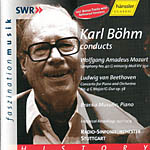This Hänssler release features two Karl Böhm performances drawn from the SWR radio archives. The Beethoven, from 1953, features the sensitive pianism of Brancka Musulin, who turns in a reading suffused with a refined poetic fire, even if her passion occasionally causes her fingers to lose their grip (as in the climax of the first-movement development). Böhm conducts the Stuttgart Radio Symphony with youthful vigor and verve. The mono recording presents the orchestra in clear, full sound, though the piano sounds as if taped in a separate, acoustically dry room.
Moving ahead to 1974 we find Böhm’s energy undimmed for this serious-minded yet lyrically flowing performance of Mozart’s Symphony No. 40. Böhm combines his characteristic Mozartian elegance and ear for detail with his renowned intellectual rigor. The Stuttgart players respond in kind, offering generously warm tone and cleanly articulated rhythms. The recorded sound in this case is somewhat over-reverberant (giving it an opaque quality), but quite decently balanced. As a bonus, the disc features 21 minutes of Böhm rehearsing the Mozart–an item of interest mainly to the conductor’s German-speaking fans.
































